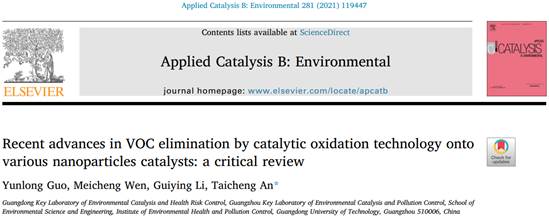近日广东工业大学环境健康与污染控制研究院、环境科学与工程学院郭云龙博士后等通过对历年来关于VOCs催化降解的相关文献进行系统的阅读和总结,在环境领域高水平期刊Applied Catalysis B: Environmental(IF2019=16.683)纪念Prof. Maria Flytzani Stephanopoulos的专刊上发表了题为“Recent advances in VOC elimination by catalytic oxidation technology onto various nanoparticles catalysts: a critical review, 2021, 281: 119447”的综述文章。该综述全面系统地阐述了VOCs氧化反应机理、催化剂性能的归一化比较以及VOCs光热催化降解的最新进展,并且对目前最新关于VOCs消除方面的相关文献进行了全面系统的总结和分析。

挥发性有机物(VOCs)成分复杂,具有渗透、挥发及脂溶等特性,还具有毒性、刺激性及致畸致癌作用,对人类健康和生态环境构成了严重威胁,催化氧化技术是一种非常有效降解VOCs的理想工艺。这篇综述系统地总结了关于纳米颗粒催化剂应用于VOCs催化消除的最新研究进展,主要分为以下5个部分:首先基于统一的性能指标,评价并比较了用于VOCs降解的催化剂的催化性能;其次基于实验和理论研究,系统地介绍了VOCs氧化反应机理;然后对VOCs催化消除过程中采用的反应器进行了系统性总结;特别还介绍了集成热催化和光催化的光热催化技术;最后对催化消除VOCs所面临的科学问题和挑战以及未来发展提出了独到的见解和展望。总的来说,该综述可为纳米颗粒催化剂的理性制备和应用于VOCs降解机理与应用提供理论和实验基础。
论文DOI:https://doi.org/10.1016/j.apcatb.2020.119447
图文摘要:

论文英文摘要:
Volatile organic compounds (VOCs) with the properties of volatility, toxicity and diffusivity pose a serious threat to human health and eco-environment. Catalytic oxidation technology has been considered as a highly efficient option for the treatment of VOCs. This review systematically summarizes the recent processes and advances on catalytic elimination of VOCs over nanoparticles catalysts. Firstly, catalytic performances of catalysts for VOC degradation are evaluated and compared on the basis of unified performance metrics. Secondly, catalytic mechanisms of VOC oxidation, based on experimental and theoretical studies, are systematically introduced. Then, catalytic reactors employed in VOC elimination processes are summarized. In particular, photothermocatalysis by integrating (thermo)catalysis with photocatalysis is also elucidated. Lastly, the perspectives to the scientific issues and challenges faced, as well as the future outlooks are proposed. Collectively, this review will provide theoretical and experimental foundation for rational fabrication and application of nanoparticles catalysts toward VOC elimination in future.
资助项目:本研究受到国家自然科学基金(41425015, 41731279和21707020),广东省本土创新团队项目(2017BT01Z032),广东省教育厅创新团队项目(2017KCXTD012),广东省重点研发计划项目(2019B110206002)以及广东省科技创新领军人才项目(2016TX03Z094)的基金支持。